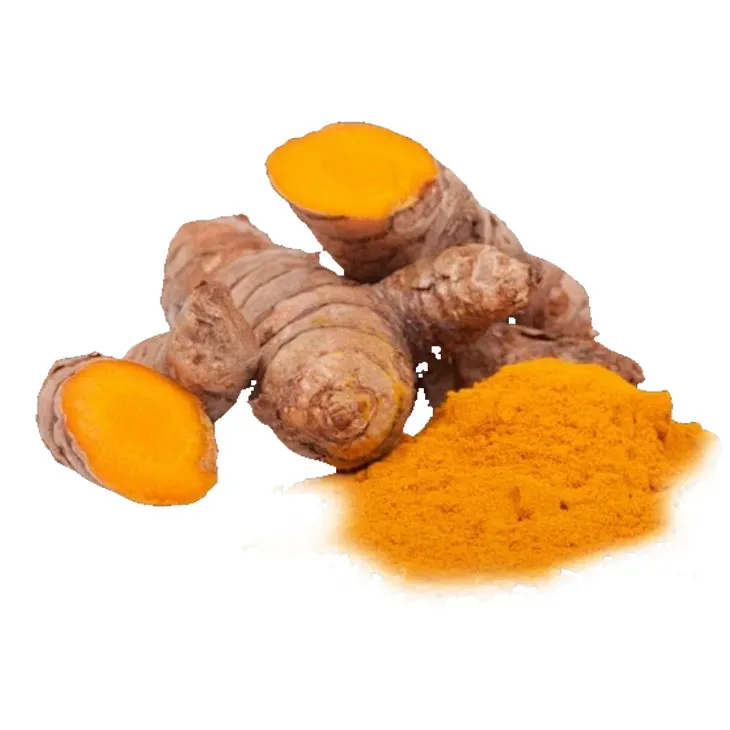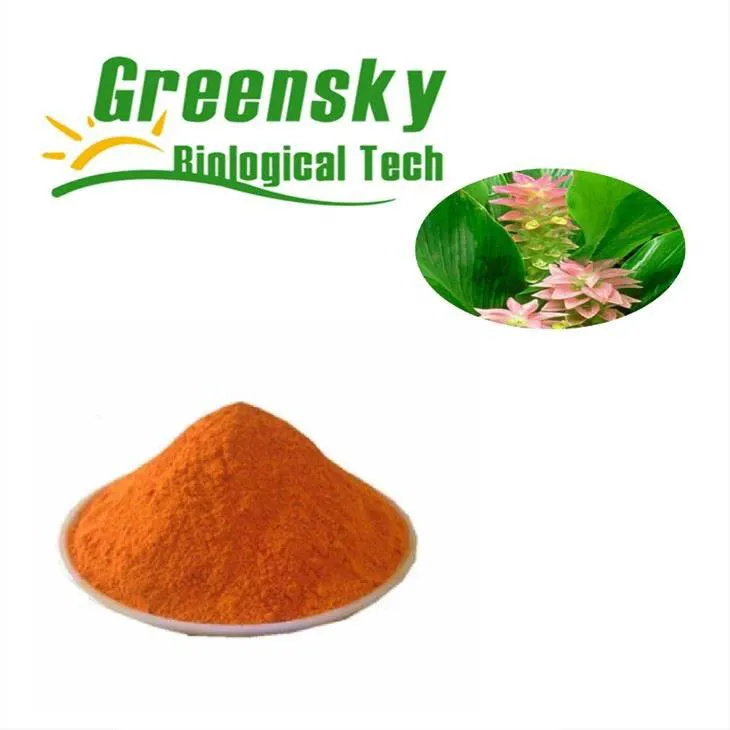- 0086-571-85302990
- sales@greenskybio.com
Can curcumin reduce cholesterol?
2024-11-14

Cholesterol management is a significant concern in modern healthcare. High cholesterol levels are associated with an increased risk of heart disease, stroke, and other cardiovascular problems. As a result, there is a growing interest in finding natural and effective ways to lower cholesterol. Curcumin, a compound found in turmeric, has emerged as a potential candidate in this regard. This article will explore the question of whether Curcumin can indeed lower cholesterol, examining evidence from various research perspectives.
1. Introduction to Curcumin
Curcumin is the principal curcuminoid in turmeric, a spice that has been used for centuries in traditional medicine, particularly in Ayurvedic and Chinese medicine. It is well - known for its bright yellow color and distinct flavor, which is commonly used in cooking, especially in Asian and Middle - Eastern cuisines.
Beyond its culinary uses, curcumin has attracted significant scientific attention due to its numerous health - promoting properties. It is a powerful antioxidant, which means it can neutralize free radicals in the body. Free radicals are unstable molecules that can cause damage to cells, proteins, and DNA, and are associated with aging and various diseases. Additionally, curcumin has strong anti - inflammatory properties. Chronic inflammation is thought to play a role in many diseases, including heart disease, cancer, and neurodegenerative disorders.

2. Cholesterol Basics
Cholesterol is a waxy, fat - like substance that is essential for the normal functioning of the body. It is produced by the liver and also obtained from certain foods. There are two main types of cholesterol: low - density lipoprotein (LDL) cholesterol, often referred to as "bad" cholesterol, and high - density lipoprotein (HDL) cholesterol, known as "good" cholesterol.
LDL cholesterol can build up in the walls of arteries, forming plaques that can narrow the arteries and restrict blood flow. This process is known as atherosclerosis and is a major risk factor for heart disease and stroke. On the other hand, HDL cholesterol helps to remove excess cholesterol from the bloodstream and transport it back to the liver for disposal.

3. How Curcumin May Affect Cholesterol
3.1 Interaction with Cholesterol - Synthesizing Enzymes
One of the ways curcumin may lower cholesterol is by interacting with enzymes involved in cholesterol synthesis. The liver is the primary site of cholesterol production in the body, and a key enzyme in this process is HMG - CoA reductase. Statins, a class of drugs commonly used to lower cholesterol, work by inhibiting this enzyme.
Research has suggested that curcumin may also have an effect on HMG - CoA reductase. In laboratory studies, curcumin has been shown to modulate the activity of this enzyme, potentially reducing the production of cholesterol in the liver. However, the exact mechanism of this interaction is still not fully understood, and more research is needed to determine the significance of this effect in humans.
3.2 Enhancing Cholesterol Clearance
Another way curcumin may influence cholesterol levels is by enhancing the clearance of cholesterol from the body. Curcumin may increase the expression of genes involved in cholesterol transport, such as those related to HDL - mediated cholesterol efflux.
HDL cholesterol plays a crucial role in removing cholesterol from peripheral tissues, including artery walls, and transporting it back to the liver for excretion. By promoting the function of HDL, curcumin could help to reduce the overall burden of cholesterol in the body. Additionally, curcumin may also affect the liver's uptake and metabolism of cholesterol, further contributing to its clearance.

4. Evidence from In - Vitro and Animal Studies
In - vitro studies, which are experiments conducted in test tubes or cell cultures, have provided some initial evidence of curcumin's potential to lower cholesterol. For example, studies using liver cells in culture have shown that curcumin can reduce cholesterol synthesis by modulating the activity of relevant enzymes.
Animal studies have also yielded promising results. In rodent models of high - cholesterol diets, curcumin supplementation has been associated with reduced levels of LDL cholesterol and increased levels of HDL cholesterol. These effects were often accompanied by a decrease in the formation of atherosclerotic plaques in the arteries of the animals.
However, it is important to note that in - vitro and animal studies have limitations. The results obtained in these studies may not always directly translate to humans due to differences in physiology between species and the artificial nature of in - vitro systems.

5. Evidence from Human Studies
Human studies on the effect of curcumin on cholesterol levels are relatively limited but growing. Some small - scale clinical trials have been conducted to investigate this relationship.
In one study, participants who consumed curcumin supplements for a certain period showed a modest reduction in LDL cholesterol levels compared to those who received a placebo. However, the magnitude of the reduction was not as large as that achieved with statin medications.
Another study focused on individuals with metabolic syndrome, a condition often associated with abnormal cholesterol levels. The results indicated that curcumin supplementation may have a beneficial effect on improving lipid profiles, including reducing triglyceride levels and increasing HDL cholesterol levels.
Despite these positive findings, more large - scale, long - term human studies are needed to confirm the efficacy of curcumin in lowering cholesterol and to determine the optimal dosage and duration of treatment.

6. Factors Affecting Curcumin's Efficacy in Cholesterol Lowering
6.1 Bioavailability of Curcumin
One of the major challenges in using curcumin for its potential cholesterol - lowering effects is its low bioavailability. Curcumin is poorly absorbed in the gut, and a large portion of it is excreted from the body without being fully utilized.
Various strategies have been explored to improve curcumin's bioavailability, such as combining it with certain fats or using specialized formulations like liposomal curcumin or curcumin nanoparticles. These approaches may enhance the absorption of curcumin in the body and potentially increase its effectiveness in lowering cholesterol.
6.2 Diet and Lifestyle Factors
Diet and lifestyle also play important roles in determining the effectiveness of curcumin in cholesterol management. A diet high in saturated and trans fats can counteract the potential cholesterol - lowering effects of curcumin. Therefore, it is essential for individuals who are taking curcumin supplements or consuming turmeric - rich foods to also follow a healthy diet that is low in these harmful fats.
Regular exercise is another key factor. Exercise can have a positive impact on cholesterol levels by increasing HDL cholesterol and reducing LDL cholesterol. Combining curcumin supplementation with a regular exercise routine may enhance the overall cholesterol - lowering effects.
7. Implications for Those Seeking Natural Cholesterol Management
For individuals who are looking for natural ways to manage their cholesterol levels, curcumin offers an interesting option. However, it should not be considered a substitute for medical advice or treatment, especially for those with high - risk cholesterol profiles or existing cardiovascular diseases.
Incorporating turmeric - rich foods, such as turmeric - spiced curries or turmeric - infused drinks, into the diet can be a simple and enjoyable way to increase curcumin intake. Additionally, curcumin supplements are widely available in the market, but it is important to choose high - quality products and consult a healthcare provider before starting supplementation, especially considering the factors that can affect its effectiveness.
In conclusion, while the evidence from research suggests that curcumin may have a role in lowering cholesterol, more studies are needed to fully understand its mechanisms of action and to establish its efficacy in humans. Meanwhile, maintaining a healthy diet, regular exercise, and appropriate medical management remain the cornerstones of cholesterol control.
FAQ:
How does curcumin interact with enzymes involved in cholesterol synthesis?
Curcumin may interact with enzymes in cholesterol synthesis through various mechanisms. It could bind to specific sites on these enzymes, inhibiting their activity. For example, it might interfere with the function of HMG - CoA reductase, which is a key enzyme in the cholesterol synthesis pathway. By doing so, it reduces the production of cholesterol in the body.
What are the other benefits of curcumin besides potentially lowering cholesterol?
Curcumin has numerous other benefits. It is a powerful antioxidant, which means it can neutralize harmful free radicals in the body. This helps protect cells from damage. It also has anti - inflammatory properties, which can be beneficial for conditions such as arthritis. Additionally, curcumin may have a role in improving brain function, reducing the risk of certain cancers, and improving heart health in other ways aside from cholesterol management.
Are there any side effects of using curcumin to lower cholesterol?
When used in normal dietary amounts, curcumin is generally considered safe. However, in some cases, high - dose supplements may cause side effects. These can include digestive issues such as nausea, diarrhea, or an upset stomach. It may also interact with certain medications, so it's important to consult a doctor if you are taking other drugs, especially blood thinners or medications for diabetes.
How much curcumin should one take to potentially lower cholesterol?
There is no one - size - fits - all answer to this question. Current research does not provide a definitive dosage for using curcumin specifically to lower cholesterol. However, in general, studies have used a range of doses. Some research has used doses as low as 500 mg per day, while others have gone up to 3 grams per day. It's important to note that taking high doses should be done under the guidance of a healthcare professional.
Can curcumin replace cholesterol - lowering medications?
At present, curcumin cannot replace cholesterol - lowering medications. While there is evidence that curcumin may have a role in cholesterol management, the evidence is not strong enough to recommend it as a substitute for medications. Cholesterol - lowering medications such as statins have been extensively studied and proven effective in reducing cholesterol levels and the risk of heart disease. However, curcumin may be used as a complementary approach in addition to medications, under the guidance of a doctor.
Related literature
- The Effect of Curcumin on Cholesterol Metabolism: A Review"
- "Curcumin and Cardiovascular Health: Focus on Cholesterol"
- "Investigating the Role of Curcumin in Cholesterol - Lowering: Recent Research Findings"
- ▶ Hesperidin
- ▶ citrus bioflavonoids
- ▶ plant extract
- ▶ lycopene
- ▶ Diosmin
- ▶ Grape seed extract
- ▶ Sea buckthorn Juice Powder
- ▶ Beetroot powder
- ▶ Hops Extract
- ▶ Artichoke Extract
- ▶ Reishi mushroom extract
- ▶ Astaxanthin
- ▶ Green Tea Extract
- ▶ Curcumin Extract
- ▶ Horse Chestnut Extract
- ▶ Other Problems
- ▶ Boswellia Serrata Extract
- ▶ Resveratrol Extract
- ▶ Marigold Extract
- ▶ Grape Leaf Extract
- ▶ blog3
- ▶ blog4
- ▶ blog5
-
Organic Tongkat Ali extract powder factory.
2024-11-14
-
How to make powder with ashwagandha extract.
2024-11-14
-
Rosehip extract manufacturers from China.
2024-11-14
-
The best cat's claw extract in nature.
2024-11-14
-
Chinese Dandelion Leaf Extract Suppliers.
2024-11-14
-
Hawthorn Extract
2024-11-14
-
White Willow Bark Extract
2024-11-14
-
Clove Powder
2024-11-14
-
Diosmin
2024-11-14
-
Acai Berry Extract
2024-11-14
-
Passionflower Extract
2024-11-14
-
White Peony Extract
2024-11-14
-
Ginseng Root Extract
2024-11-14
-
Lemon Juice Powder
2024-11-14
-
Shikonin
2024-11-14





















